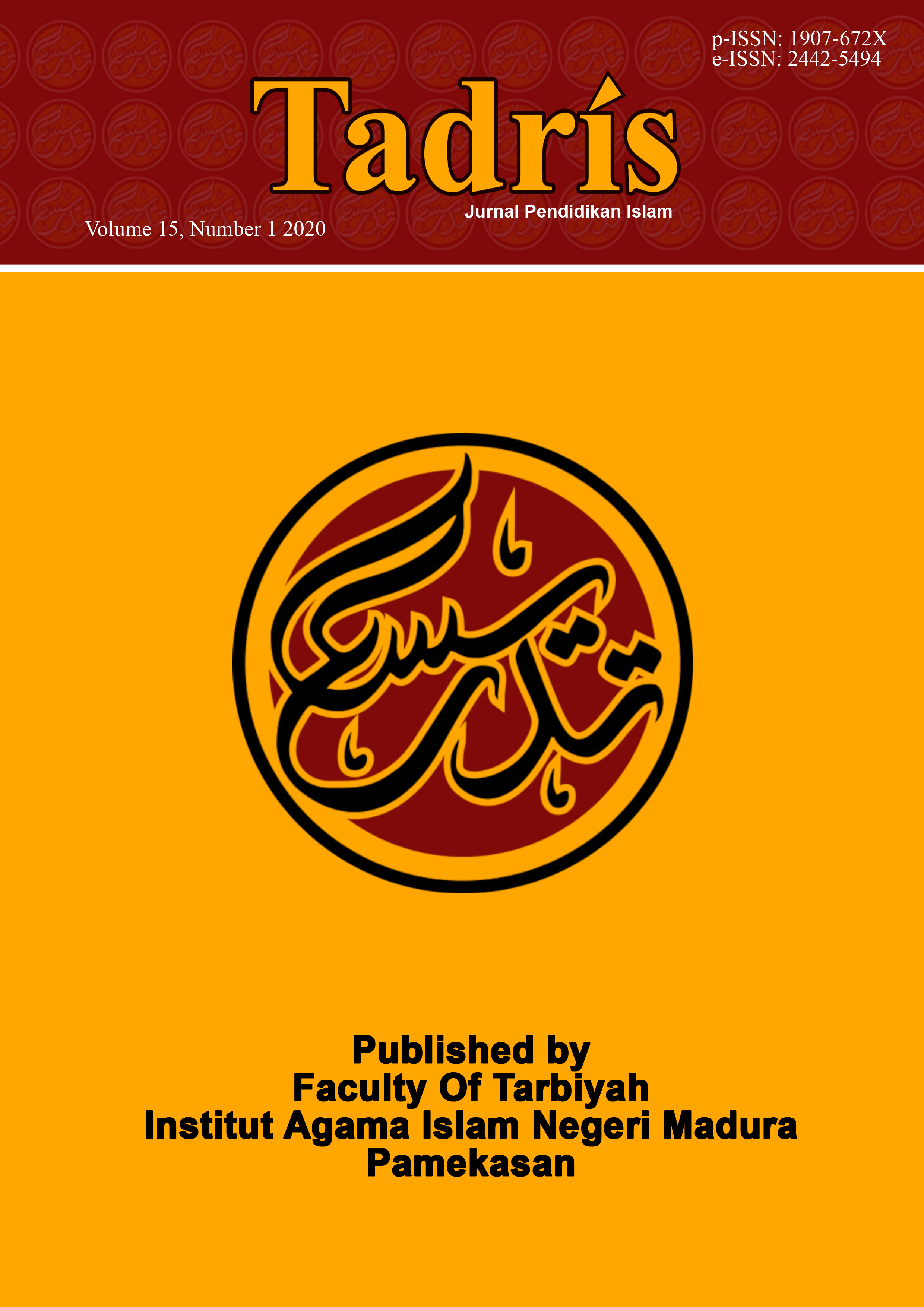Integrasi Pendidikan Karakter dalam Pembelajaran Akidah Akhlak
 Abstract views: 864
,
Abstract views: 864
,
 PDF downloads: 898
PDF downloads: 898
Abstract
In recent time, character education is viewed as important thing in education, even it has been applied in all education institutions. In this writing, the approach of integration theory is used to analyze the integration of character education in learning process of study at school, especially the learning process of Akidah Akhlak. It is because akidah akhlak has a big role in teaching the value of Islam to the students. The objective of this research is to know the process of integration of character education in learning process of Akidah Akhlak. This research used descriptive qualitative method by using phenomenological approach, the phenomenology approach used to understand the phenomenon by looking directly how is the integration of character education in learning process of Akidah Akhlak which is being taught by teachers in class rooms of MIN 11 Aceh Tenggara, based on observation, interview and documentation. The result of this research shows that the integration of character education in learning process of Akidah Akhlak is done through the main competence, the objectives of study and the learning method used by akidah akhlak’s teachers.
Downloads
References
Ahmadi, Rulam. (2014). Pengantar pendidikan: asas dan filsafat pendidikan. Yogyakarta: Ar-Ruzz Media.
Al-Ghazali, Abu Hamid Muhammad bin Muhammad. Ihya Ulumuddin. Beirut: Dar al-Fikr, n.d.
Tem Penyusun. (2014). Buku Guru Akidah Akhlak. Jakarta: Kementerian Agama.
Departemen Agama Republik Indonesia. Mushaf Al-Quran Terjemah. Edited by Abdul Aziz and Abdur Rauf ed. (2005). Jakarta: Al-Huda Kelompok Gema Insani 2002nd.
Emzir, and Sam M. Chan.(2010). Isu-Isu Kritis Kebijakan Pendidikan Era Otonomi Daerah. Jakarta: Ghalia Indonesia.
Ginting, Abdurrahman. (2008). Esensi Praktis Belajar dan Pembelajaran. Bandung: Pustaka Setia.
Hadijaya, Yusuf. (November 23, 2015). “PENGEMBANGAN KURIKULUM INTEGRATIF PENDIDIKAN DASAR DAN MENENGAH MENUJU PEMBELAJARAN EFEKTIF SEBUAH ANALISIS KRITIS.” JURNAL TARBIYAH 22, no. 2. https://doi.org/10.30829/tar.v22i2.38.
Kebudayaan, Kementerian Pendidikan dan. “Badan Penelitian Dan Pengembangan | Kementerian Pendidikan Dan Kebudayaan.” Badan Penelitian dan Pengembangan | Kementerian Pendidikan dan Kebudayaan. Accessed January 7, 2019. http://litbang.kemdikbud.go.id/content/02_%20SKL%20MAPEL%20SD-MI.pdf.
Miles, Matthew B, and A. Michael Huberman. (1992). Analisis Penelitian Kualitatif. Translated by Tjerjep Rohendi Rohidi. Jakarta: UI-Press.
Moleong, Lexy J. (2014). Metodologi Penelitian Kualitatif. Edisi Revisi. Bandung: Remaja Rosdakarya.
Muhaimin, and Abdul Mujib. (1993). Pemikiran pendidikan Islam: kajian filosofis dan kerangka dasar operasionalisasinya. Bandung: Trigenda Karya.
Mujiono, Imam. (2002). Ibadah dan Akhlak dalam Islam. Yogyakarta: UII Press.
Muliawan, Jasa Ungguh. (2005). Pendidikan Islam Integratif. Yogyakarta: Pustaka Pelajara.
Mulyadi. (2005). Aqidah Akhlak. Semarang: Toha Putra.
Nashir, Haedar. 2013). Pendidikan Karakter Berbasis Agama Dan Budaya. Yogyakarta: Multi Presindo.
Omar Muhammad Al-Toumy Al-Syaibany. (1979). Falsafatut Tarbiyah Al Islamiyah. Translated by Hasan Langgulung. I. Jakarta: Bulan Bintang.
“PP_74_Tahun_2008.Pdf.” Accessed January 7, 2019. https://unnes.ac.id/wp-content/uploads/PP_74_Tahun_2008.pdf.
Siddik, Dja’far. (2011). Konsep Dasar Ilmu Pendidikan Islam. Bandung: Citapustaka Media Perintis.
Sugiyono. (2015). Metode penelitian pendidikan: (pendekatan kuantitatif, kualitatif dan R & D). Bandung: Alfabeta.
Sugono, Dendy, ed. (2008). Kamus Besar Bahasa Indonesia. Jakarta: Pusat Bahasa.
“UU2003.Pdf,” n.d.
Zubaedi. (2012). Desain Pendidikan Karakter: Konsepsi dan Aplikasinya dalam Lembaga Pendidikan Islam. Cet 2. Jakarta: Kencana.
Zuchdi, Damiyati, Zuhdan Kun Prasetya, and Muhsinatun Siasah Masruri. (2013). Model Pendidikan Karakter: Terintegrasi Dalam Pembelajaran dan Pengembangan Kultur Sekolah. Yogyakarta: Multi Presindo.
Copyright (c) 2020 TADRIS: Jurnal Pendidikan Islam

This work is licensed under a Creative Commons Attribution-NonCommercial 4.0 International License.
The journal operates an Open Access policy under a Creative Commons Non-Commercial 4.0 International license. Authors who publish with this journal agree to the following terms:
- Authors retain copyright and grant the journal right of first publication with the work simultaneously licensed under a
 Commons Attribution-NonCommercial 4.0 International License
Commons Attribution-NonCommercial 4.0 International Licensethat allows others to share — copy and redistribute the material in any medium or format, and adapt — remix, transform, and build upon the material.
- Authors are able to enter into separate, additional contractual arrangements for the non-exclusive distribution of the journal's published version of the work (e.g., post it to an institutional repository or publish it in a book), with an acknowledgement of its initial publication in this journal.
- Authors are permitted and encouraged to post their work online (e.g., in institutional repositories or on their website) prior to and during the submission process, as it can lead to productive exchanges, as well as earlier and greater citation of published work (see The Effect of Open Access).














